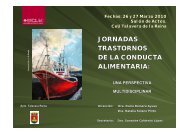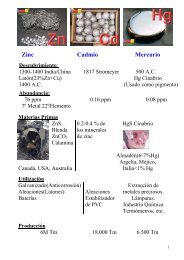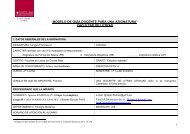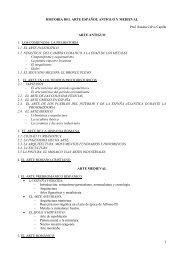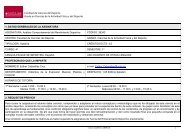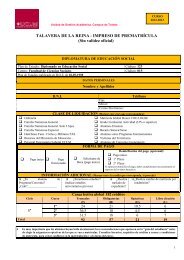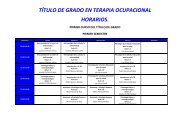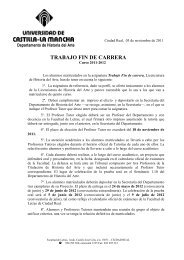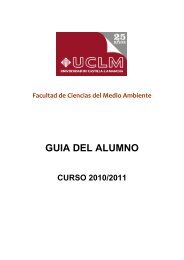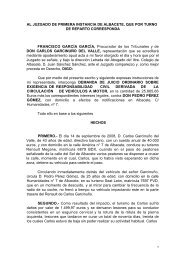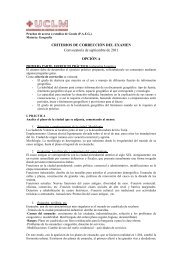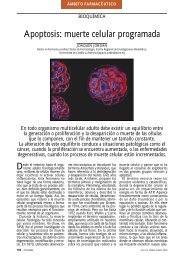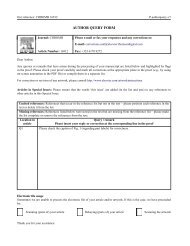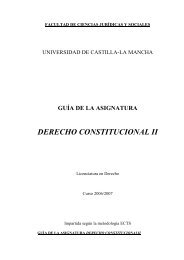Hª de la Lengua Inglesa I
Hª de la Lengua Inglesa I
Hª de la Lengua Inglesa I
Create successful ePaper yourself
Turn your PDF publications into a flip-book with our unique Google optimized e-Paper software.
HISTORIA DE LA LENGUA INGLESA IGUÍA DOCENTE1. DATOS GENERALES DE LA ASIGNATURAASIGNATURA: Historia <strong>de</strong> <strong>la</strong> <strong>Lengua</strong> <strong>Inglesa</strong> ICÓDIGO:CARÁCTER: Asignatura Obligatoria (OB)CENTRO: Facultad <strong>de</strong> Letras <strong>de</strong> Ciudad Real GRADO: Estudios Ingleses / <strong>Lengua</strong>s Mo<strong>de</strong>rnas, Curso 2010-2011RAMA DE CONOCIMIENTO: Artes y Humanida<strong>de</strong>s CRÉDITOS ECTS: 6CURSO: 2º SEMESTRE: 2ºLENGUA EN QUE SE IMPARTIRÁ: inglésUSO DOCENTE DE OTRAS LENGUAS (sólo si es relevante):PROFESORADO QUE LA IMPARTENOMBRE/S: Javier E. Díaz Verae-mail: JavierEnrique.Diaz@uclm.esDEPARTAMENTO: Filología Mo<strong>de</strong>rna DESPACHO: 214HORARIO DE ATENCIÓN AL ALUMNO: Se fijará al inicio <strong>de</strong>l curso.JUSTIFICACIÓN EN EL PLAN DE ESTUDIOS, RELACIÓN CON OTRAS ASIGNATURAS Y CON LA PROFESIÓN· La asignatura <strong>de</strong>sarrol<strong>la</strong> los contenidos <strong>de</strong> <strong>la</strong> materia básica <strong>Lengua</strong> y Linqüística <strong>Inglesa</strong>s <strong>de</strong>l grado en Estudios Ingleses / <strong>Lengua</strong>s Mo<strong>de</strong>rnas <strong>de</strong> <strong>la</strong> UCLM.Para <strong>la</strong> re<strong>la</strong>ción <strong>de</strong>tal<strong>la</strong>da con otras asignaturas <strong>de</strong>l presente título y <strong>la</strong> actividad profesional remitimos a <strong>la</strong> correspondiente memoria <strong>de</strong>l grado en EstudiosIngleses / <strong>Lengua</strong>s Mo<strong>de</strong>rnas <strong>de</strong> <strong>la</strong> UCLM.1
2. REQUISITOS PREVIOSNo hay requisitos previos.3. COMPETENCIAS DE LA TITULACIÓN QUE LA ASIGNATURACONTRIBUYE A ALCANZAR(consultar Proyecto <strong>de</strong> Título e incluir aquí sólo <strong>la</strong>s trabajadas específicamente -y, por tanto, evaluables-, en esta asignatura)Key Transferable Skills:A capacity to analyse and synthesizeA capacity to work in groupsAbility to work in<strong>de</strong>pen<strong>de</strong>ntlyA capacity for in<strong>de</strong>pen<strong>de</strong>nt thought and judgement, and ability to assess thecritical i<strong>de</strong>as of othersAn ability to handle information and argument in a critical manner, and have aself-critical approach to their own writingAn appreciation of the uniqueness of other culturesSubject-specific Skills:A command of a broad range of vocabu<strong>la</strong>ry and critical terminology specific tothe historical linguisticsCritical skills in the close reading and analysis of selected textsA sufficient knowledge of the grammar and vocabu<strong>la</strong>ry of Old EnglishAbility to carry out linguistic analysis and commentary from a comparativehistoricalperspectiveAn ability to produce either a written or oral response to the literature un<strong>de</strong>rstudy, which is articu<strong>la</strong>te, analytical, well-argued and well-researched.An ability to critically judge and evaluate existing scho<strong>la</strong>rship in the field with aview to i<strong>de</strong>ntifying research topics for further studyObjectives:4. OBJETIVOS O RESULTADOS ESPERADOSTo introduce stu<strong>de</strong>nts to the <strong>la</strong>nguage and culture of the Anglo-Saxon periodTo study the linguistic evolution of the English <strong>la</strong>nguageTo enable stu<strong>de</strong>nts to recognize and <strong>de</strong>scribe processes of linguistic variationand changeOn completion of this subject the stu<strong>de</strong>nt will:Have <strong>de</strong>veloped the skills outlined oppositeHave learnt the basic principles of English historical linguisticsHave acquired a knowledge and un<strong>de</strong>rstanding of Old EnglishHave completed a discursive, aca<strong>de</strong>mic essay on a given topic2
5. TEMARIO / CONTENIDOSI. LANGUAGE VARIATION AND CHANGE1. Analyzing linguistic variation and change2. Linguistic reconstruction3. Why do <strong>la</strong>nguages change?II. LANGUAGE FAMILIES1. Linguistic re<strong>la</strong>tionships1.1. The family-tree mo<strong>de</strong>l1.2. The wave mo<strong>de</strong>l2. Proto<strong>la</strong>nguage:2.1. Proto-Indoeuropean3. The Germanic family of <strong>la</strong>nguages3.1. Origins and dialectal distribution3.2. The p<strong>la</strong>ce of EnglishIII. HISTORICAL SOCIOLINGUISTICS OF ENGLISH1. Eng<strong>la</strong>nd before the Anglo-Saxons2. Anglo-Saxon Eng<strong>la</strong>nd3. Norman Eng<strong>la</strong>nd4. The Middle English period5. Towards an English standard6. The British Empire7. English as a world <strong>la</strong>nguageIV. THE FORMATION OF OLD ENGLISH 1: PHONOLOGY1. Principles of diachronic phonology2. Pre-historic English3. Dialectal fragmentation4. The phonological system of Old English3
V. THE FORMATION OF OLD ENGLISH 2: MORPHOSYNTAX1. Inflective, agglutinative and iso<strong>la</strong>ting <strong>la</strong>nguages2. The morphology of I<strong>de</strong>: An overview3. Nominal morphology of Old English3.1. Strong nouns3.2. Weak nous3.3. Athematic nouns3.4. Minor c<strong>la</strong>sses3.5. Pronouns3.6. Adjectives: strong and weak3.7. Adverbs4. Verbal morphology of Old English4.1. Strong verbs4.2. Weak verbs4.3. Preterite-present verbs4.4. Irregu<strong>la</strong>r verbs5. Old English syntax: Selected topics5.1. Case assignment5.2. Word or<strong>de</strong>r5.3. Some c<strong>la</strong>use types5.4. Prepositons and postpositionsVI. THE FORMATION OF OLD ENGLISH 3: VOCABULARY6.1. Inherited vocabu<strong>la</strong>ry6.2. Lexical borrowing6.3. Lexical <strong>de</strong>rivation6.4. Semantic change: metaphor and metonymy4
6 y 7. ACTIVIDADES O BLOQUES DE ACTIVIDAD Y METODOLOGÍA CON SU CARGA EN HORAS DE TRABAJO PARA ALUMNO YPROFESOR Y SU VALORACIÓNActivida<strong>de</strong>sTiempo<strong>de</strong> actividadpresencial(Profesor y Alumno)Tiempo <strong>de</strong> actividadautónoma(Alumno)Tiempo totalValoración en notafinalC<strong>la</strong>se teórica: impartición <strong>de</strong> contenidosteóricos18 18 36Attendance andParticipation 5%C<strong>la</strong>se práctica (resolución <strong>de</strong> problemasy ejercicios, asignación y comentarios<strong>de</strong> lecturas)18 18 36Attendance andParticipation 5%Lecturas: 40 40Presentación trabajo escrito: 12 24 36 30%Sesiones <strong>de</strong> evaluación 2 260%TOTAL 50 horas 100 horas 150 horas 100%6 CRÉDITOS ECTS5
8. CRITERIOS DE EVALUACIÓNIn or<strong>de</strong>r to pass this subject the stu<strong>de</strong>nt must attend and actively participate in 80% of the lectures and practical c<strong>la</strong>sses, complete a 1500 wor<strong>de</strong>ssay on a given topic, and pass the end of year exam.9. CRONOGRAMA / CALENDARIODuración <strong>de</strong>l curso: 15 semanas (4 horas disponibles en el au<strong>la</strong> por semana) = 60 horas:Semana 1 Presentación 1h.Semana 2 C<strong>la</strong>ses Teórico-Prácticas 4 h. Semana 3 C<strong>la</strong>ses Teórico-Prácticas 4 h.C<strong>la</strong>ses Teórico-Prácticas 2h.Reading 1 1hSemana 4 C<strong>la</strong>ses Teórico-Prácticas 3h. Semana 5 C<strong>la</strong>ses Teórico-Prácticas 4 h. Semana 6 C<strong>la</strong>ses Teórico-Prácticas 4 h.Reading 2 1hSemana 7 C<strong>la</strong>ses Teórico-Prácticas 3h.Reading 3 1hSemana 8 C<strong>la</strong>ses Teórico-Prácticas 4h. Semana 9 C<strong>la</strong>ses Teórico-Prácticas 3h.Reading 4 1hSemana 10 C<strong>la</strong>ses Teórico-Prácticas 4 h. Semana 11 C<strong>la</strong>ses Teórico-Prácticas 4 h. Semana 12 Oral presentations 4 h.Semana 13 Oral presentations 4 h. Semana 14 Oral presentations 4 h. Semana 15 Exam revision6
10. BIBLIOGRAFÍA, RECURSOSBasic readings:Baugh, A.C. & T. Cable. 1994. A History of the English Language. London: Routledge.Fischer, Olga. 2000. The Syntax of early English. Cambridge: CUP.Lass, Roger. 1994. Old English: A historical-linguistic Companion. Cambridge: CUP.References:INTRODUCCIÓN A LA LINGÜÍSTICA HISTÓRICA Y AL CAMBIO LINGÜÍSTICOAitchinson, J. 1992. Language Change: Progress or Decay? Cambridge, New York & Melbourne: Cambridge University Press.Bynon, Theodora. 1981. Lingüística histórica. Madrid: Gredos.Campbell, L. 1998. Historical Linguistics. An Introduction. Cambridge, Mass.: The MIT Press.Crowley, T. 1998. An Introduction to Historical Linguistics. Oxford: Oxford University Press.Hock, H.H, and D.J. Brian. 1996. Language History, Language Change, and Language Re<strong>la</strong>tionship: an Introduction to Historical andComparative Linguistics. Trends in Linguistics, 93. Berlin: Mouton <strong>de</strong> Gruyter.Jeffers, R.J. & I. Lehiste. 1982. Principles and Methods for Historical Linguistics. Cambridge & London: The MIT Press.Lass, R. 1997. Historical Linguistics and Language Change. Cambridge Studies in Linguistics 81. Cambridge: Cambridge UniversityPress.Lehmann, W.P. 1992. Historical Linguistics. Third Edition. London and New York: Routledge. (Edición en español: Introducción a <strong>la</strong>lingüística histórica. Traducción <strong>de</strong> Pi<strong>la</strong>r Gómez Bedat. Madrid: Gredos, 1969).Núñez, Salvador, 1993. <strong>Lengua</strong>je e historia. Barcelona: Octaedro.Tejada Caller, P. 1999. El cambio lingüístico. C<strong>la</strong>ves para interpretar <strong>la</strong> lengua inglesa. Madrid: Alianza Editorial, S.A.Trask, R.L. 1994. Language Change. London & New York: Routledge.HISTORIA EXTERNAFennell, B.A. 2004. A History of English: a Sociolinguistic Approach. B<strong>la</strong>ckwell Textbooks in Linguistics, 17. Mal<strong>de</strong>n: B<strong>la</strong>ckwell.Fernán<strong>de</strong>z, F. 1998- A History of English. Notes on External History. Valencia: Albatros.Fisiak, J. 1995. An Outline History of English. Volume One: External History. Póznan: Kantor Wydawniczy Saww.Graddol, D., D. Leith & J. Swann. 2001. English: History, Diversity and Change. London: Routledge, 2001.Knowles, Gerry. 1997. A Cultural History of the English Language. London, etc.: Arnold.7
Leith, D. 1983. A Social History of English. London, Boston, Melbourne & Henley: Routledge & Kegan Paul.McCrum, Rober. 1987. The Story of English. London: Faber & Faber and BBC Books.Mitchell, B. 1995. An Invitation to Old English and Anglo-Saxon Eng<strong>la</strong>nd. Oxford: B<strong>la</strong>ckwell.MANUALES DE INGLÉS ANTIGUOBaker, P. 2003. Introduction to Old English. Mal<strong>de</strong>n, Oxford & Victoria: B<strong>la</strong>ckwell.B<strong>la</strong>keley, L. 1964. Old English. London: The English Universities Press Ltd.Campbell, A. 1959. Old English Grammar. Oxford: Oxford University Press.Hogg, R.M. 1992. A Grammar of Old English. Volume 1: Phonology. Oxford, UK and Cambridge, USA: B<strong>la</strong>ckwell.Hogg, R.M. 2002. An Introduction to Old English. Edinburgh Textbooks on the English Language. Edinburgh: Edinburgh UniversityPress.Kispert, R.J. 1971. Old English. An Introduction. New York, etc.: Holt, Rinehart and Winston, Inc.Lass, R. & J.M. An<strong>de</strong>rson. 1975. Old English Phonology. Cambridge: Cambridge University Press.Magennis, H. 1990. Discovering Old English. Gui<strong>de</strong>d Readings. Belfast: Ultonian Press.McCully, C. & Hilles, S. 2005. The Earliest English. An Introduction to the Old English Language. Harlow, Eng<strong>la</strong>nd & New York :Pearson & Longman.Mitchell, B. & F.C. Robinson. 1992. A Gui<strong>de</strong> to Old English. Oxford & Cambridge (US): B<strong>la</strong>ckwell.Nielsen, H. F. 1998. The Continental Background of English and its Insu<strong>la</strong>r Development until 1154. O<strong>de</strong>nse: O<strong>de</strong>nse University Press.DICCIONARIOSBarney, S.A. 1985. Word-Hoard: An Introduction to Old English Vocabu<strong>la</strong>ry. New Haven: Yale University Press.Bosworth, J. & T.N. Toller. 1921 [1898] An Anglo-Saxon Dictionary. Based on the Manuscript Collections of the Late Joseph Bosworth.Oxford: C<strong>la</strong>rendon Press.Hall, C. 1993. A Concise Anglo-Saxon Dictionary. Toronto: The University of Toronto Press.Roberts, J. & C. Kay with L. Grundy. 2000. A Thesaurus of Old English. Two volumes. Amsterdam: Rodopi.Sweet, H. 1985. The Stu<strong>de</strong>nt’s Dictionary of Anglo-Saxon. Oxford: Oxford University Press.Recursos en Internet8



